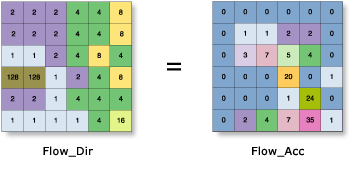Available with Spatial Analyst license.
Summary
Creates a raster of accumulated flow into each cell. A weight factor can optionally be applied.
Illustration

Usage
The result of Flow Accumulation is a raster of accumulated flow to each cell, as determined by accumulating the weight for all cells that flow into each downslope cell.
Cells of undefined flow direction will only receive flow; they will not contribute to any downstream flow. A cell is considered to have an undefined flow direction if its value in the flow direction raster is anything other than 1, 2, 4, 8, 16, 32, 64, or 128.
The accumulated flow is based on the number of cells flowing into each cell in the output raster. The current processing cell is not considered in this accumulation.
Output cells with a high flow accumulation are areas of concentrated flow and can be used to identify stream channels.
Output cells with a flow accumulation of zero are local topographic highs and can be used to identify ridges.
If the input flow direction raster is not created with the Flow Direction tool, there is a chance that the defined flow could loop. If the flow direction does loop, Flow Accumulation will go into an infinite loop and never finish.
The Flow Accumulation tool does not honour the Compression environment setting. The output raster will always be uncompressed.
See Analysis environments and Spatial Analyst for additional details on the geoprocessing environments that apply to this tool.
Syntax
FlowAccumulation (in_flow_direction_raster, {in_weight_raster}, {data_type})| Parameter | Explanation | Data Type |
in_flow_direction_raster | The input raster that shows the direction of flow out of each cell. The flow direction raster can be created using the Flow Direction tool. | Raster Layer |
in_weight_raster (Optional) |
An optional input raster for applying a weight to each cell. If no weight raster is specified, a default weight of 1 will be applied to each cell. For each cell in the output raster, the result will be the number of cells that flow into it. | Raster Layer |
data_type (Optional) |
The output accumulation raster can be integer or floating point type.
| String |
Return Value
| Name | Explanation | Data Type |
| out_accumulation_raster | The output raster that shows the accumulated flow to each cell. | Raster |
Code sample
FlowAccumulation example 1 (Python window)
This example creates a raster of accumulated flow into each cell of an input flow direction Grid raster.
import arcpy
from arcpy import env
from arcpy.sa import *
env.workspace = "C:/sapyexamples/data"
outFlowAccumulation = FlowAccumulation("flowdir")
outFlowAccumulation.save("C:/sapyexamples/output/outflowacc01")
FlowAccumulation example 2 (stand-alone script)
This example creates a raster of accumulated flow into each cell of an input flow direction IMG raster.
# Name: FlowAccumulation_Ex_02.py
# Description: Creates a raster of accumulated flow to each cell.
# Requirements: Spatial Analyst Extension
# Import system modules
import arcpy
from arcpy import env
from arcpy.sa import *
# Set environment settings
env.workspace = "C:/sapyexamples/data"
# Set local variables
inFlowDirRaster = "flowdir"
inWeightRaster = ""
dataType = "INTEGER"
# Check out the ArcGIS Spatial Analyst extension license
arcpy.CheckOutExtension("Spatial")
# Execute FlowDirection
outFlowAccumulation = FlowAccumulation(inFlowDirRaster, inWeightRaster, dataType)
# Save the output
outFlowAccumulation.save("C:/sapyexamples/output/outflowacc02.img")
Environments
Licensing information
- ArcGIS Desktop Basic: Requires Spatial Analyst
- ArcGIS Desktop Standard: Requires Spatial Analyst
- ArcGIS Desktop Advanced: Requires Spatial Analyst